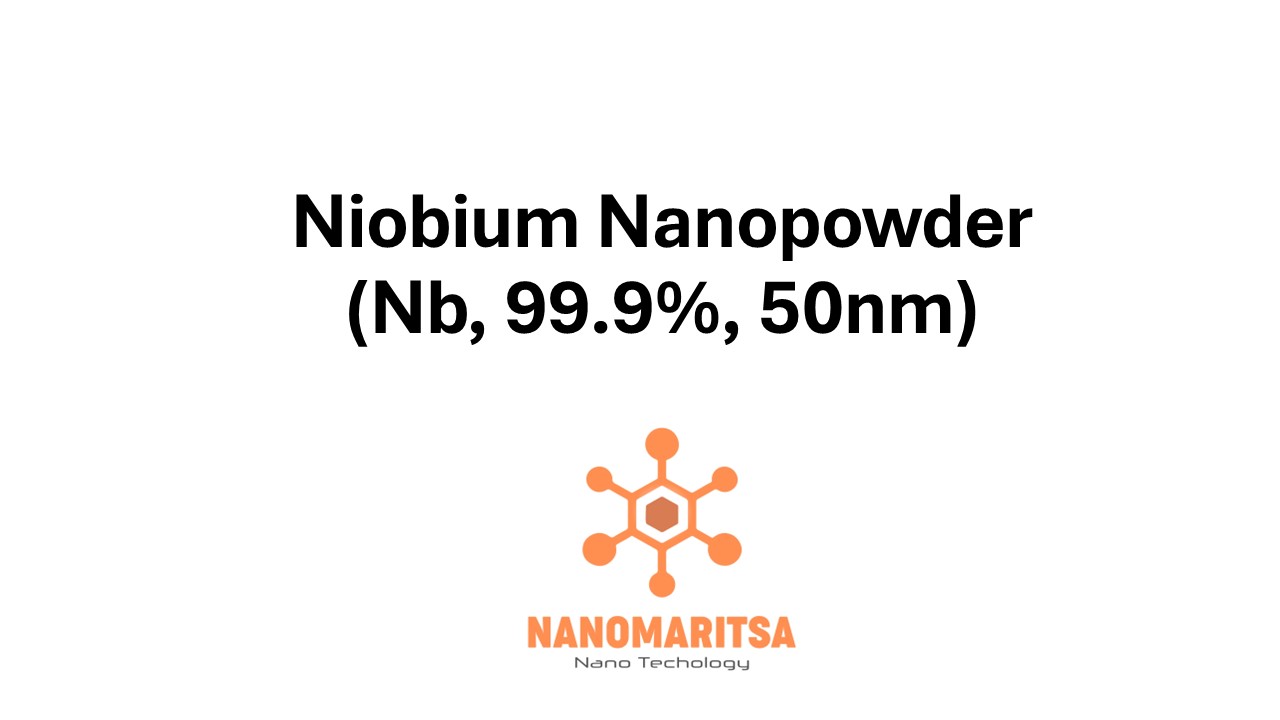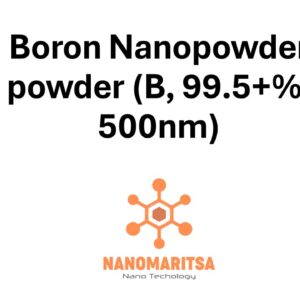Niobium Nanopowder (Nb, 99.9%, 50 nm) is a high-purity material composed of niobium nanoparticles with a particle size of 50 nanometers (nm) and a purity of 99.9%. This nanopowder retains many of the beneficial properties of bulk niobium, such as high melting point, corrosion resistance, and superconductivity, while offering enhanced properties at the nanoscale, including increased surface area and reactivity. These attributes make niobium nanopowder an ideal material for advanced applications in fields such as electronics, energy storage, aerospace, and material science. Below is a detailed overview of the key features, properties, and applications of niobium nanopowder.
Key Features:
Niobium (Nb):
Niobium is a transition metal known for its high melting point, excellent corrosion resistance, and superconducting properties. At the nanoscale, niobium’s characteristics, such as surface area and reactivity, are significantly enhanced, making it suitable for a range of specialized applications.
Purity (99.9%):
With a purity of 99.9%, the niobium nanopowder is of high quality with minimal impurities. This ensures consistent and reliable performance in critical applications that require high material purity and stability.
Particle Size (50 nm):
The 50 nm particle size provides a balance between high surface area and stability. It is large enough to offer good handling properties while still enhancing reactivity and dispersion, making it ideal for use in catalytic processes, energy storage, and composite materials.
Properties:
Corrosion Resistance:
Niobium is highly resistant to corrosion, especially in acidic and alkaline environments. This property is maintained in niobium nanopowder, making it ideal for use in harsh chemical environments, such as in chemical processing, aerospace applications, and corrosion-resistant coatings.
Superconductivity:
Niobium is known for its superconducting properties at low temperatures. Niobium nanopowder can contribute to the development of superconducting materials, which are essential for applications such as magnetic resonance imaging (MRI), particle accelerators, and quantum computing.
High Melting Point:
Niobium has an exceptionally high melting point (~2,477°C), which makes it suitable for high-temperature applications. This property allows niobium nanopowder to retain its performance in extreme environments, such as in aerospace, energy production, and high-temperature alloys.
High Surface Area and Reactivity:
Due to its nanometer-sized particles, niobium nanopowder has a significantly larger surface area compared to bulk niobium. This high surface area enhances its reactivity, making it effective as a catalyst or in catalytic applications where rapid chemical reactions are required.
Electrical Conductivity and Magnetic Properties:
Niobium exhibits excellent electrical conductivity, and its nanopowder form retains this property, making it suitable for use in electrical components and energy storage systems. It also has magnetic properties that can be utilized in specific electronic and magnetic applications.
Strength and Durability:
Niobium is known for its excellent strength-to-weight ratio and durability. These properties are retained in niobium nanopowder, making it ideal for use in high-performance alloys, composites, and components that require durability and resistance to wear.
Applications:
- Catalysis and Chemical Reactions:
Niobium nanopowder is commonly used in catalytic processes, such as hydrogenation, dehydrogenation, and other chemical reactions. Its high surface area and reactivity make it an excellent material for speeding up chemical reactions, particularly in the production of specialty chemicals and fuels. - Superconducting Materials:
Niobium nanopowder is used in the development of superconducting materials for applications such as magnetic resonance imaging (MRI) machines, particle accelerators, and superconducting magnets. Niobium’s superconducting properties make it essential in advanced research and technology. - Energy Storage and Batteries:
Niobium nanopowder is used in energy storage applications, including lithium-ion batteries, due to its excellent conductivity and high surface area. Niobium is also being researched for its potential in advanced battery technologies and energy storage systems, where efficiency and performance are critical. - Aerospace and Defense:
Niobium’s high melting point and strength make it an ideal material for aerospace and defense applications. Niobium nanopowder is used in the production of lightweight, high-strength alloys for components exposed to extreme temperatures, such as in jet engines and space exploration. - Corrosion-Resistant Coatings:
Due to its excellent corrosion resistance, niobium nanopowder is used in protective coatings for metals in harsh environments. It is often used in marine, industrial, and chemical applications where corrosion resistance is essential for the longevity of components. - Alloys and Composite Materials:
Niobium nanopowder is used to enhance the properties of alloys and composite materials. It is commonly used in the production of high-performance materials that require enhanced strength, durability, and resistance to wear, such as in automotive, aerospace, and industrial applications. - Electronics and Electrical Components:
Niobium’s electrical conductivity makes it suitable for use in various electronic and electrical applications, including capacitors, resistors, and transistors. Niobium nanopowder is also used in the development of conductive materials for energy storage devices and advanced electronics. - Quantum Computing and Research:
Niobium’s superconducting properties make it a key material in the development of quantum computing technologies. It is used in the creation of superconducting circuits and quantum bits (qubits) for future quantum computing applications. - Medical and Biomedical Applications:
Niobium is biocompatible and is used in medical implants and prosthetics. Niobium nanopowder is being explored for use in medical devices, particularly those that require high strength, corrosion resistance, and durability, such as in implants and stents.
Handling and Safety:
Health and Safety Considerations:
Niobium nanopowder should be handled with care to avoid inhalation or skin contact, as fine powders can be harmful if inhaled. Appropriate personal protective equipment (PPE), such as gloves, masks, and safety goggles, should be worn during handling. Work in a well-ventilated area or use fume extraction systems to avoid inhaling fine dust particles.
Storage:
Niobium nanopowder should be stored in a cool, dry, and well-ventilated environment to avoid contamination and oxidation. It should be kept in tightly sealed containers to protect it from moisture, air, or contamination.
Precautions:
Avoid generating dust or aerosols when handling niobium nanopowder, as fine particulates can pose health risks. Work in a controlled environment, and dispose of any waste material in accordance with local environmental regulations.
Summary:
Niobium Nanopowder (Nb, 99.9%, 50 nm) is a high-purity material with enhanced properties such as high surface area, excellent corrosion resistance, superconductivity, and high melting point. These features make it a versatile material in various advanced applications, including catalysis, superconducting technologies, energy storage, aerospace, and corrosion-resistant coatings. Niobium nanopowder is also used in alloys, composites, and electronic components, offering significant improvements in material performance and efficiency. Proper handling, storage, and safety precautions are crucial for ensuring safe and effective use of this material in cutting-edge industries and technologies.
| Measurement (gr) | 25 grams, 100 grams |
|---|






